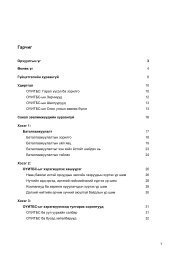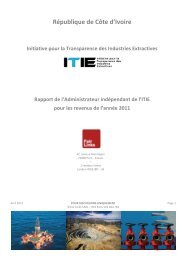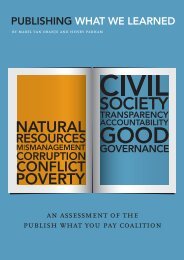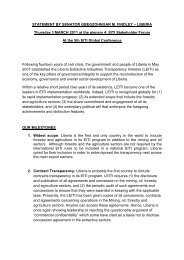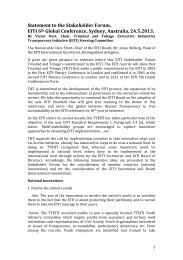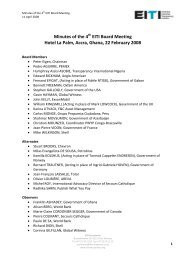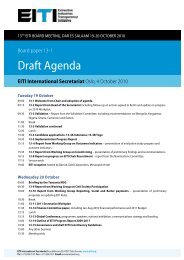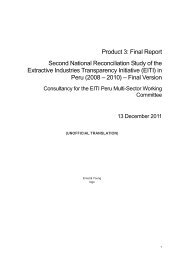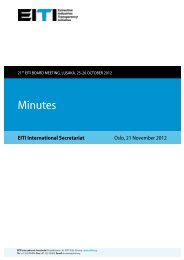EITI Business Guide
EITI Business Guide
EITI Business Guide
You also want an ePaper? Increase the reach of your titles
YUMPU automatically turns print PDFs into web optimized ePapers that Google loves.
Glossary<br />
Accountability a person or organisation is accountable when they acknowledge responsibility for actions, decisions<br />
and policies that affect other people or organisations. accountability includes the obligation to be<br />
answerable for the consequences of these actions, decisions and policies.<br />
Administrator an independent entity (usually an audit firm) that is appointed to acquire and attempt to reconcile<br />
(sometimes called payments and revenue data provided by companies and government. The administrator is not<br />
aggregator or reconciler) carrying out an audit, but is compiling and analysing <strong>EITI</strong> data (both financial and, where appropriate,<br />
on production volumes) as submitted, and investigating and explaining any discrepancies, as set out<br />
in the Terms of reference that the multi-stakeholder group and the administrator have agreed.<br />
Aggregation a method of reporting by which the payments made by individual companies are consolidated, so<br />
that individual company payments cannot be identified in a published <strong>EITI</strong> report. It can also refer to<br />
the consolidation of different types of payments made by a company so that individual payment<br />
types cannot be identified.<br />
Candidate Country a country which has publicly committed to implement the <strong>EITI</strong>, but which has not yet fully<br />
implemented all of the required stages.<br />
Company Form a country-Level company self-assessment Form (see Appendix 4) must be completed by all relevant<br />
companies in implementing countries during the validation process. an International-Level company<br />
self-assessment Form (see Appendix 5) should be completed and kept up-to-date by companies that<br />
have committed to support <strong>EITI</strong> at the international level.<br />
Compliant Country a country which has fully implemented the <strong>EITI</strong> and has been found by an independent validating<br />
organisation to be meeting all of the validation indicators.<br />
Country Workplan an action plan agreed by a multi-stakeholder group. The <strong>EITI</strong> criteria requires that the Workplan is<br />
financially sustainable and includes measured targets, a timetable for implementation, and an<br />
assessment of potential capacity constraints.<br />
Disaggregation a method of reporting by which individual companies’ payments made to a government are<br />
disclosed and can be identified separately. It can also refer further to reporting individual types of<br />
payments, so that each payment type (royalty, tax, etc.) can be identified.<br />
<strong>EITI</strong> Report a report that is put together by an administrator and made publicly available, stating how extractive<br />
industries payments made by companies match those received by governments – and explaining<br />
discrepancies where they arise.<br />
Materiality a threshold amount or percentage to determine if a company or a payment is significant to an<br />
(or materiality threshold) outcome. <strong>EITI</strong>-implementing countries often set materiality levels based on company or payment size.<br />
Multi-stakeholder a committee that has been empowered to develop the country Workplan, and oversee the<br />
group implementation and management of the <strong>EITI</strong> programme. The role of this group includes the<br />
appointment of the administrator and validator.<br />
Validation The process by which progress on implementing the <strong>EITI</strong> by countries is measured against the <strong>EITI</strong><br />
criteria. The agreed standard is for an <strong>EITI</strong> candidate country to be independently validated at least<br />
every two years, using an independent validator who will gather information on that country’s <strong>EITI</strong><br />
process, interview key stakeholders and measure the country against a set of validation indicators.<br />
countries which meet all of those indicators will be assessed as being ‘<strong>EITI</strong> compliant’. compliant<br />
countries must be validated every five years, or earlier if the <strong>EITI</strong> International Board requires.<br />
Validation Report a report that is put together by an independent validator assessing the country’s progress in<br />
implementing the <strong>EITI</strong> against indicators outlined in the validation <strong>Guide</strong>.<br />
26 <strong>EITI</strong> BusInEss GuIdE



